Hebrew Israelites will hate this.
You are using an out of date browser. It may not display this or other websites correctly.
You should upgrade or use an alternative browser.
You should upgrade or use an alternative browser.
Beyonce- Black is King
- Thread starter Jordan>>LeFrozen
- Start date
More options
Who Replied?Yeah I've actually been listening to this alot. Did any of the songs on this project get a push?
Only one that got pushed was “Spirit” and that’s cause of the movie...
She didn’t push none of the songs from the soundtrack besides the single after it dropped because she was most likely filming the movie.
But IMO she REALLY should have pushed “Bigger” as the main single because it’s the strongest song of the album. “Spirit” sounds like something you hear during the end credits..
“Bigger” is her “Circle Of Life” and could have been used in the movie..
The live action movie is still trash though 

murksiderock
Superstar
This song is crack:
Shout out to Bey, I don't agree with the criticism she getting. I haven't watched the film, just seen the videos,, but this is a great look...
Shout out to Bey, I don't agree with the criticism she getting. I haven't watched the film, just seen the videos,, but this is a great look...
ITS DOPE
TOP TIER PRODUCTION
TOP TIER PRODUCTION
Hebrew Israelites will hate this.
THEY HATE EVERYTHING
She's SPITTING 
Black is King, Beyoncé is not

Arah Iloabugichukwu
Aug 3·9 min read
At what point does cultural exploration become cultural exploitation?
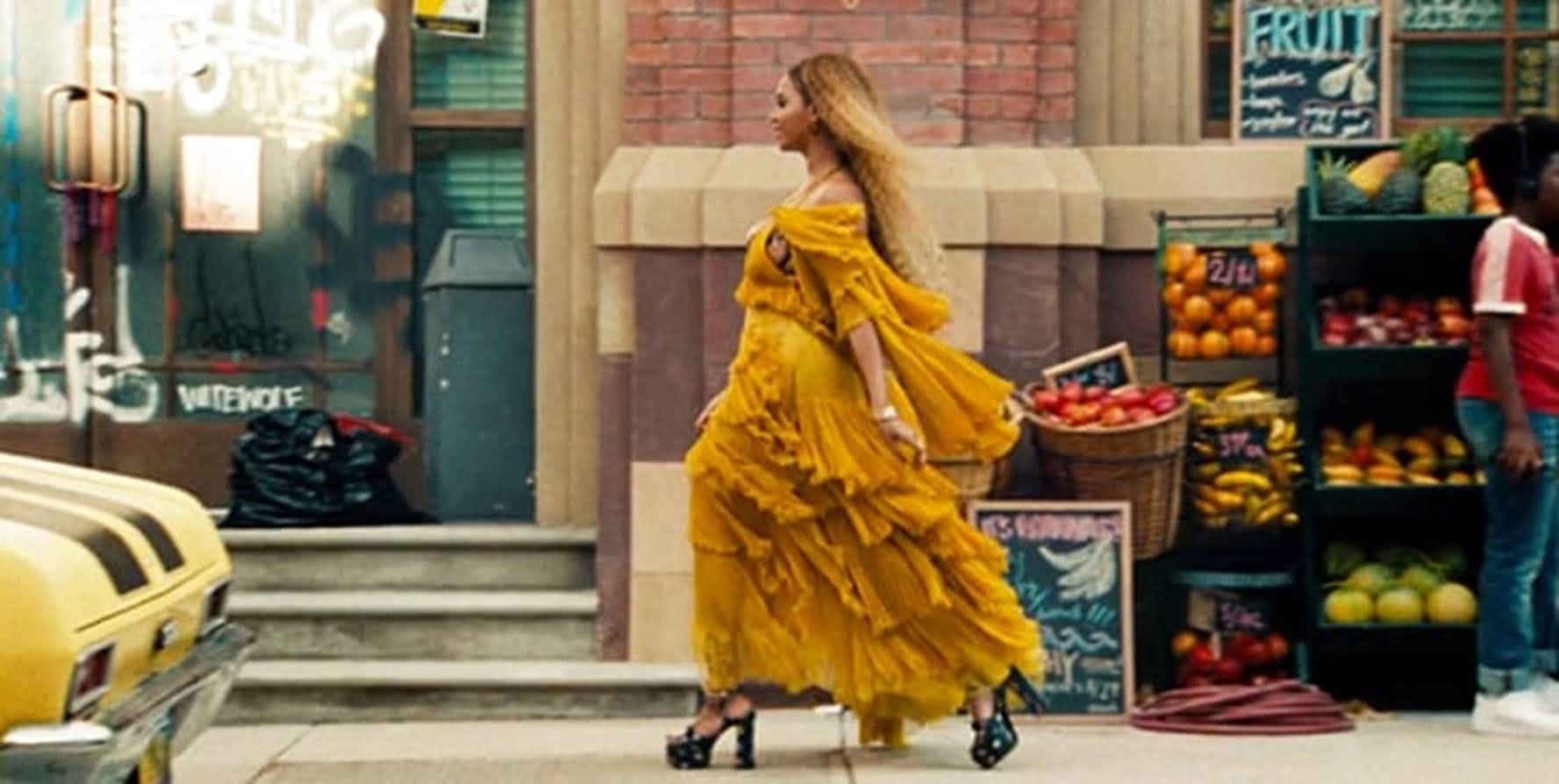
This conversation will not go over well with many, dare I say most, but I have made my peace with that. In an attempt to dodge the vitriolic, and sometimes violent, feedback that often comes with having an adverse opinion on the work of this artist, I believe it’s in my best interest to preface this piece with a few statements.
◙ The first being that this is not a critique of Beyoncé Giselle Knowles-Carter as a person, nor as a Black woman, nor as a musician.
◙ The second being that this is not an attempt to discredit the obvious amount of work and the brilliant minds that have contributed to the cultivation of her two most recent visual creations; Lemonade and Black Is King.
◙ The third and final being that this article may contain information that challenges your previously held convictions, I only ask that you adopt an open and non-defensive stance as you navigate the many nuances.
My sweet paternal grandmother, whose photo now adorns the devotional altar in my bedroom, was a legendary Uli woman. Uli, or Eduli in its unabbreviated form, is a sacred, linear-oriented body-inscribing aesthetic performed and passed by women in pre-contemporary Igbo society. The Igbo people, from whom I derive on my father’s side, are an ethnic group found in present-day Southeastern and South-central Nigeria. As a young girl, my grandmother, who lived well into her 70’s, was taught the art of Uli by the elder Uli women of our village, Ogui Agu Eke. My sweet grandmother practiced and performed this sacred painting until she transitioned to the next life, and as she transitioned, she took a wealth of wisdom with her.
There was a time Uli was found throughout Igboland. In the olden days, women and girls would congregate to practice and partake in the ritual rite. While young girls watched the elder women decorate each other’s bodies using the deeply pigmented dyes, stories of Ala, the female Igbo deity of the earth, would be shared. Carefully, slowly, the elder Uli women would make each marking with great attention to detail, each stroke carrying its significance, each pattern holding a purpose. This shared ceremony welcomed women and young girls of all ages, as we joined in preparation for naming ceremonies and weddings, funerals, and festivals. But as colonialism would have it, Uli would become synonymous with our “sinful” old ways.
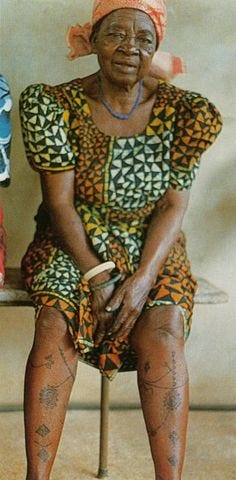
Abrahamic religions ushered in a new era, and much of the old would be ostracized. “We don’t practice Uli anymore”, my aunt would advise as safety concerns grew, “Not while others are watching.” The meaningful markings would become associated with witchcraft and sorcery, elder Uli women would be made to live in isolation as their families converted to more “forward-thinking” ideologies. But in the 1960s, Uli would see a resurgence in the Western art world, only now designating men as the authority on this once feminine art form.
When the visual album for Beyoncé’s lemonade was released, I immediately recognized the white body paint adorning the female dancers who sat aside one another while riding in a metal bus, swaying in unison to the albums fourth song, “Sorry”. I wasn’t sure what to feel. Sure, it was a beautiful sight to behold. Uli, after all, is a beautiful art form. But was this the introduction it warranted? Where was the oh, so important explanation of its’ historical relevance, was there more to this modern rendition than a few dance moves? Articles celebrating the artist’s monumental achievement began to climb my timeline, “Brooklyn’s Laolu Senbanjo brings his practice of a sacred Yoruba ritual to the main screen” the headlines read. In that instance, I saw my history erased once more. Such a beautiful art form once strictly deemed for and by West African women now neatly packaged under a new name, “Ori”.
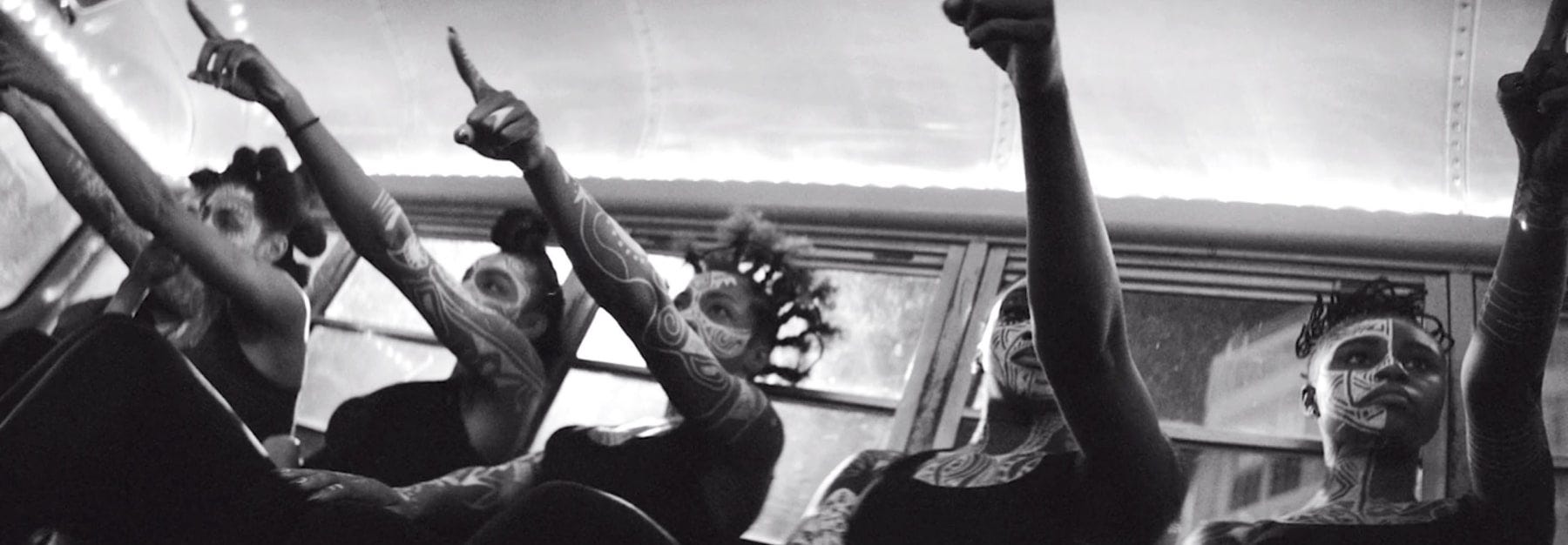
In another scene accompanying the second track off the album, the camera captured Beyonce in a bright yellow dress, carrying a bat and beating the brakes off of a vintage vehicle. The striking visuals were enveloped in twin references and poems pouring devotion to Oshun, once again the indigenous associations began. “She’s paying homage to an Orisha”, people protested. “Beyonce’s been initiated into Oshun”, fans confided in confidence. But deities aren’t for dress-up, I rebutted. Besides, culture without context is easily convoluted, a concept I assumed we here in the West understood quite well.
I questioned the quest of the stunning symbology. What good was dressing up as an Orisha, if doing so dishonored the traditional spiritual system the deity signified? Sure, we could dress up as catholic priests to bring awareness to the ancient ways of Jewish Palestinian people, or we could actually honor the history, and that doesn’t always look like choreography and a choir. In my attempts to explain that you couldn’t be initiated into a deity, that Orishas were not celebrities, that Halloween costumes didn’t honor the ancestors, I was dismissed as having disdain for Beyoncé, and once that happens, reason and rationale have left the room. I thought to myself, would we be as dismissive if members of a dominant culture found an artistic expression offensive to their spiritual system? Would we “All Religions Matter” the conversation or consider the informed source? Perhaps she had a plan, I told myself, perhaps this was a snippet of the bigger picture. Surely, she understood the severity of her impact, didn’t these cultural clips warrant some sort of serious discussion? Apparently not.
Almost immediately, I began seeing a surge in the Beyoncé-backed trend of “face painting”. I cringed every time I heard it hollered. Black women began an unabashed obsession with Oshun, one that had no real reverence for the spiritual system from which her image derived (Ask me how I know). Sure, there was an exposure to imagery from the mother continent, but without the context, and with Beyoncé as the unbridled focal point, what access did it offer the viewer? Photos from Brooklyn’s Afro-punk made national news as attendees took every creative license in adopting the new look. “Tribal face paint” was everywhere, no respect for its sacred reference, no idea of its feminist foundation. Think pieces began to pop up, could this be a shining example of cultural appropriation? Could Black Americans appropriate other Black cultures? Black Americans sure didn’t think so.
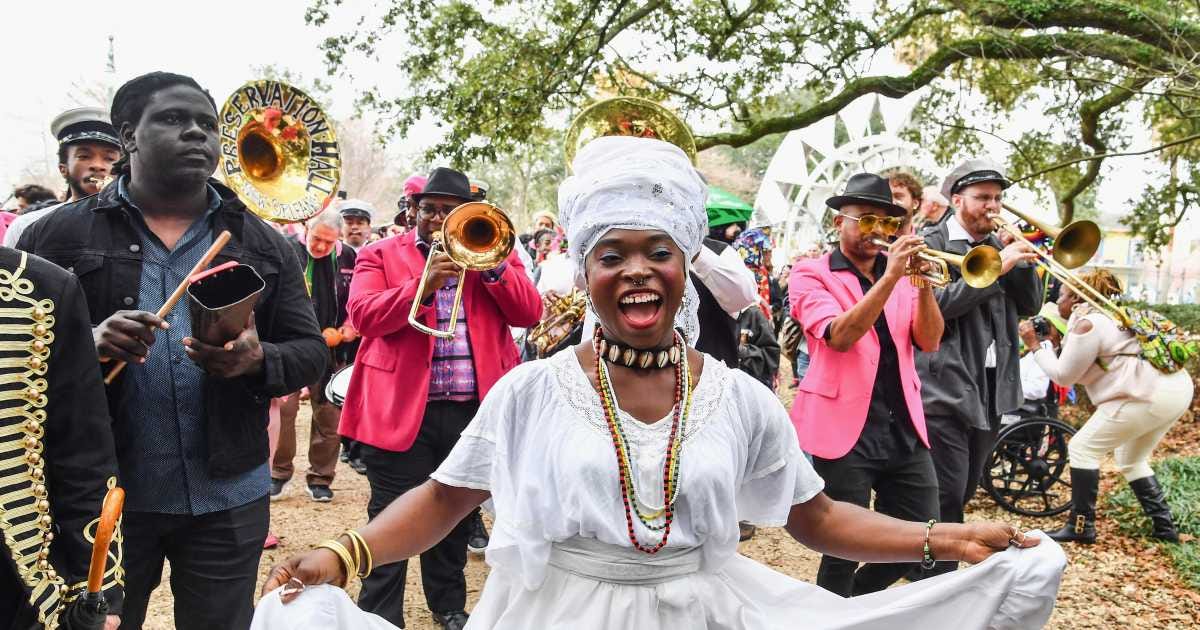
“How can we appropriate what is ours?”, the choir rang out. “African culture is Black culture and we’re all Black, so it’s all ours”. And while it’s true that we share a single race across the diaspora, we do not share a single global culture, not even on the mother continent. This means that while being Black grants us access to all Black cultures, it does NOT grant us authority. There is a big difference. When I travel to New Orleans, I recognize and respect the beautiful Black culture birthed within that city. While being Black affords me a great deal of access, it does not make me an authority. The culture of that city does not belong to me because I was born to a Black American mother. Nor am I it’s unofficial owner because the city of my birth, Pittsburgh, PA., denied its’ Black citizens the right to establish a rich culture of their own. I look to Black New Orleans as the authority on the culture of that city, as it is their contribution to global Black culture and that alone is sufficient reason. And while we seem to understand that as we cross state lines, we lose sight of that beyond U.S. borders, a true testament to our American privilege.
When I watched Black is King, I immediately felt a flush of nostalgia. It was Lemonade all over again, in other words, symbolism on steroids. A collection of beautiful but vapid visuals, village huts with highlights. People dancing in dust and hanging in trees. Posh poses and human props, overt opulence, emphasis on the ornate. If this was intended to tell the story that “We did not start off as slaves”, as Tina Lawson phrased it, it missed the mark. The use of Uli was prevalent, only this time it was Beyoncé partaking and painting a young male child. Sacred headdresses were worn on video sets, adorned with jewelry and smoking pipes. Orishas were dishonored, ritual ceremonies doubled as dance scenes. This was not some creative merging of the many Black cultures existing between the two worlds, this was a closet full of cultured costumes. The visuals were undeniably breathtaking, boisterous. Everything we think a royal return home should be, capitalism cloaked in cow skins. But did it speak to the reality of Africa? Did it educate and enlighten, as much as it entertained? Did we walk away with humility or with Halloween ideas? Did we leave having learned how to honor our ancestors, or with more jumbled spiritual jargon?
In an "); background-size: 1px 1px; background-position: 0px calc(1em + 1px); background-repeat: repeat no-repeat;">article on another Black creative, Kenya Barris, I make mention of the Black creative call, an obligation to our art that exceeds our intent at times. Beyoncé, as an artist, has an obligation to the imagery she introduces to the world, a responsibility to do so with consideration for the source, especially when dealing with ideologies and belief systems that have been systematically suppressed and destroyed. What good are these “cultured costumes” if we do with them what the West has always done, don them for photo ops and performances, push them into mass production, and participate in the desecration of the sacred? And sacred doesn’t mean secret, it means sacred. It means existing for a serious purpose, like baptism, like communion, like Catholic confession. Sacred doesn’t mean off-limits, it means access to the outside is limited, it means the entrance is lined in enlightenment.
We cannot allow our American ideals to trick us into treating African cultures as though they existed for our entertainment. They don’t. Nor does Africa need another stage to dance on. If you, as an artist, choose to go there, tapping into African cosmology, mysticism, spirituality, etc., packaging it for public consumption, then GO THERE! Exist in the space, earn the information, use your access to gain understanding and authority. Don’t lead more people to pretentious ignorance, don’t use your access to sidestep the proper process, at least not while professing to respect it. And if that’s too much to ask of the biggest Black American artist in the world, with all of her unlimited access to Black cultures around the globe, then perhaps we’re just not there yet. And that’s okay.
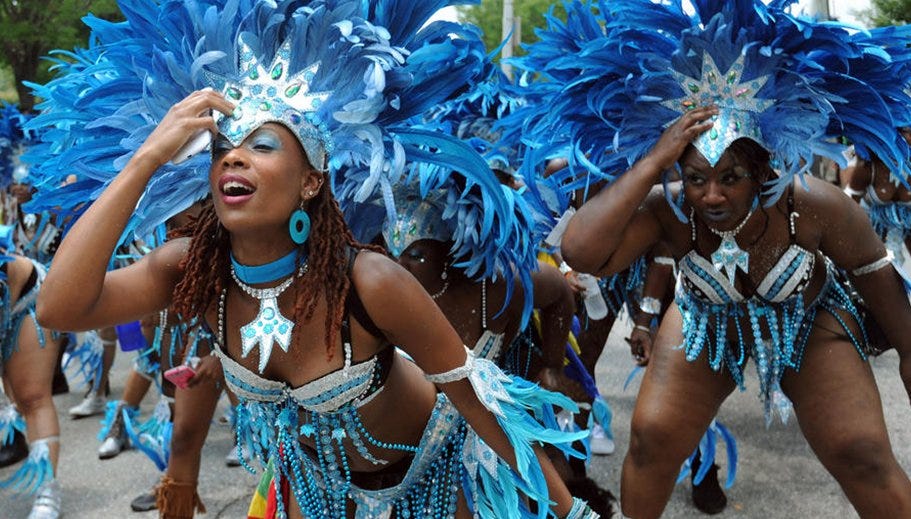
We don’t have to shut up and say our grace because Beyoncé blessed the continent with fancy forest scenes. We need to be honest about "); background-size: 1px 1px; background-position: 0px calc(1em + 1px); background-repeat: repeat no-repeat;">why we need decorated images of Africa to be proud of our origins in the first place. We can appreciate the visuals while acknowledging that it isn’t much else there. And being descendants of slavery does not give us a license to levy our cultural disconnect against the diaspora. Non-American Black cultures are not our consolation prize for being victimized by white supremacy. Black Caribbean cultures, Afro-Latino cultures, African cultures, Black American cultures, of which there are so, so many, are deserving of reverence and respect, especially by Black people.
That might mean we don’t dress in carnival attire for a costume party. That might mean we don’t wear Uli paint to the Greek picnic. That might mean we don’t get to dress our daughters up as Oshun for the Gram. That might mean we don’t use the N-word without a thorough understanding of its’ origin and impact on Black Americans, my continental Africans, I’m talking to you. Culture counts, even when it’s Black. Sacred is serious, especiallywhen it’s Black, not to mention not to be dabbled with without the necessary knowledge. Our race is shared, but our cultures are exchanged, the difference is distinct but indispensable. Black is still beautiful and we are all undeniably Black, that’s something we’ll always have in common. We are each other’s to explore, and we have an obligation to explore without exploiting.
Ways to support the Writer:
"); background-size: 1px 1px; background-position: 0px calc(1em + 1px); background-repeat: repeat no-repeat;">Subscribe to my Blog
"); background-size: 1px 1px; background-position: 0px calc(1em + 1px); background-repeat: repeat no-repeat;">Buymeacoffee.com/arahthequill/
"); background-size: 1px 1px; background-position: 0px calc(1em + 1px); background-repeat: repeat no-repeat;">Pre-Order Of Mothers and Daughters
@ArahTheQuill (Ig/Twitter)
More on Medium "); background-size: 1px 1px; background-position: 0px calc(1em + 1px); background-repeat: repeat no-repeat;">Arah Iloabugichukwu

Black is King, Beyoncé is not

Arah Iloabugichukwu
Aug 3·9 min read
At what point does cultural exploration become cultural exploitation?

This conversation will not go over well with many, dare I say most, but I have made my peace with that. In an attempt to dodge the vitriolic, and sometimes violent, feedback that often comes with having an adverse opinion on the work of this artist, I believe it’s in my best interest to preface this piece with a few statements.
◙ The first being that this is not a critique of Beyoncé Giselle Knowles-Carter as a person, nor as a Black woman, nor as a musician.
◙ The second being that this is not an attempt to discredit the obvious amount of work and the brilliant minds that have contributed to the cultivation of her two most recent visual creations; Lemonade and Black Is King.
◙ The third and final being that this article may contain information that challenges your previously held convictions, I only ask that you adopt an open and non-defensive stance as you navigate the many nuances.
My sweet paternal grandmother, whose photo now adorns the devotional altar in my bedroom, was a legendary Uli woman. Uli, or Eduli in its unabbreviated form, is a sacred, linear-oriented body-inscribing aesthetic performed and passed by women in pre-contemporary Igbo society. The Igbo people, from whom I derive on my father’s side, are an ethnic group found in present-day Southeastern and South-central Nigeria. As a young girl, my grandmother, who lived well into her 70’s, was taught the art of Uli by the elder Uli women of our village, Ogui Agu Eke. My sweet grandmother practiced and performed this sacred painting until she transitioned to the next life, and as she transitioned, she took a wealth of wisdom with her.
There was a time Uli was found throughout Igboland. In the olden days, women and girls would congregate to practice and partake in the ritual rite. While young girls watched the elder women decorate each other’s bodies using the deeply pigmented dyes, stories of Ala, the female Igbo deity of the earth, would be shared. Carefully, slowly, the elder Uli women would make each marking with great attention to detail, each stroke carrying its significance, each pattern holding a purpose. This shared ceremony welcomed women and young girls of all ages, as we joined in preparation for naming ceremonies and weddings, funerals, and festivals. But as colonialism would have it, Uli would become synonymous with our “sinful” old ways.

Abrahamic religions ushered in a new era, and much of the old would be ostracized. “We don’t practice Uli anymore”, my aunt would advise as safety concerns grew, “Not while others are watching.” The meaningful markings would become associated with witchcraft and sorcery, elder Uli women would be made to live in isolation as their families converted to more “forward-thinking” ideologies. But in the 1960s, Uli would see a resurgence in the Western art world, only now designating men as the authority on this once feminine art form.
When the visual album for Beyoncé’s lemonade was released, I immediately recognized the white body paint adorning the female dancers who sat aside one another while riding in a metal bus, swaying in unison to the albums fourth song, “Sorry”. I wasn’t sure what to feel. Sure, it was a beautiful sight to behold. Uli, after all, is a beautiful art form. But was this the introduction it warranted? Where was the oh, so important explanation of its’ historical relevance, was there more to this modern rendition than a few dance moves? Articles celebrating the artist’s monumental achievement began to climb my timeline, “Brooklyn’s Laolu Senbanjo brings his practice of a sacred Yoruba ritual to the main screen” the headlines read. In that instance, I saw my history erased once more. Such a beautiful art form once strictly deemed for and by West African women now neatly packaged under a new name, “Ori”.

In another scene accompanying the second track off the album, the camera captured Beyonce in a bright yellow dress, carrying a bat and beating the brakes off of a vintage vehicle. The striking visuals were enveloped in twin references and poems pouring devotion to Oshun, once again the indigenous associations began. “She’s paying homage to an Orisha”, people protested. “Beyonce’s been initiated into Oshun”, fans confided in confidence. But deities aren’t for dress-up, I rebutted. Besides, culture without context is easily convoluted, a concept I assumed we here in the West understood quite well.
I questioned the quest of the stunning symbology. What good was dressing up as an Orisha, if doing so dishonored the traditional spiritual system the deity signified? Sure, we could dress up as catholic priests to bring awareness to the ancient ways of Jewish Palestinian people, or we could actually honor the history, and that doesn’t always look like choreography and a choir. In my attempts to explain that you couldn’t be initiated into a deity, that Orishas were not celebrities, that Halloween costumes didn’t honor the ancestors, I was dismissed as having disdain for Beyoncé, and once that happens, reason and rationale have left the room. I thought to myself, would we be as dismissive if members of a dominant culture found an artistic expression offensive to their spiritual system? Would we “All Religions Matter” the conversation or consider the informed source? Perhaps she had a plan, I told myself, perhaps this was a snippet of the bigger picture. Surely, she understood the severity of her impact, didn’t these cultural clips warrant some sort of serious discussion? Apparently not.
Almost immediately, I began seeing a surge in the Beyoncé-backed trend of “face painting”. I cringed every time I heard it hollered. Black women began an unabashed obsession with Oshun, one that had no real reverence for the spiritual system from which her image derived (Ask me how I know). Sure, there was an exposure to imagery from the mother continent, but without the context, and with Beyoncé as the unbridled focal point, what access did it offer the viewer? Photos from Brooklyn’s Afro-punk made national news as attendees took every creative license in adopting the new look. “Tribal face paint” was everywhere, no respect for its sacred reference, no idea of its feminist foundation. Think pieces began to pop up, could this be a shining example of cultural appropriation? Could Black Americans appropriate other Black cultures? Black Americans sure didn’t think so.

“How can we appropriate what is ours?”, the choir rang out. “African culture is Black culture and we’re all Black, so it’s all ours”. And while it’s true that we share a single race across the diaspora, we do not share a single global culture, not even on the mother continent. This means that while being Black grants us access to all Black cultures, it does NOT grant us authority. There is a big difference. When I travel to New Orleans, I recognize and respect the beautiful Black culture birthed within that city. While being Black affords me a great deal of access, it does not make me an authority. The culture of that city does not belong to me because I was born to a Black American mother. Nor am I it’s unofficial owner because the city of my birth, Pittsburgh, PA., denied its’ Black citizens the right to establish a rich culture of their own. I look to Black New Orleans as the authority on the culture of that city, as it is their contribution to global Black culture and that alone is sufficient reason. And while we seem to understand that as we cross state lines, we lose sight of that beyond U.S. borders, a true testament to our American privilege.
When I watched Black is King, I immediately felt a flush of nostalgia. It was Lemonade all over again, in other words, symbolism on steroids. A collection of beautiful but vapid visuals, village huts with highlights. People dancing in dust and hanging in trees. Posh poses and human props, overt opulence, emphasis on the ornate. If this was intended to tell the story that “We did not start off as slaves”, as Tina Lawson phrased it, it missed the mark. The use of Uli was prevalent, only this time it was Beyoncé partaking and painting a young male child. Sacred headdresses were worn on video sets, adorned with jewelry and smoking pipes. Orishas were dishonored, ritual ceremonies doubled as dance scenes. This was not some creative merging of the many Black cultures existing between the two worlds, this was a closet full of cultured costumes. The visuals were undeniably breathtaking, boisterous. Everything we think a royal return home should be, capitalism cloaked in cow skins. But did it speak to the reality of Africa? Did it educate and enlighten, as much as it entertained? Did we walk away with humility or with Halloween ideas? Did we leave having learned how to honor our ancestors, or with more jumbled spiritual jargon?
In an "); background-size: 1px 1px; background-position: 0px calc(1em + 1px); background-repeat: repeat no-repeat;">article on another Black creative, Kenya Barris, I make mention of the Black creative call, an obligation to our art that exceeds our intent at times. Beyoncé, as an artist, has an obligation to the imagery she introduces to the world, a responsibility to do so with consideration for the source, especially when dealing with ideologies and belief systems that have been systematically suppressed and destroyed. What good are these “cultured costumes” if we do with them what the West has always done, don them for photo ops and performances, push them into mass production, and participate in the desecration of the sacred? And sacred doesn’t mean secret, it means sacred. It means existing for a serious purpose, like baptism, like communion, like Catholic confession. Sacred doesn’t mean off-limits, it means access to the outside is limited, it means the entrance is lined in enlightenment.
We cannot allow our American ideals to trick us into treating African cultures as though they existed for our entertainment. They don’t. Nor does Africa need another stage to dance on. If you, as an artist, choose to go there, tapping into African cosmology, mysticism, spirituality, etc., packaging it for public consumption, then GO THERE! Exist in the space, earn the information, use your access to gain understanding and authority. Don’t lead more people to pretentious ignorance, don’t use your access to sidestep the proper process, at least not while professing to respect it. And if that’s too much to ask of the biggest Black American artist in the world, with all of her unlimited access to Black cultures around the globe, then perhaps we’re just not there yet. And that’s okay.

We don’t have to shut up and say our grace because Beyoncé blessed the continent with fancy forest scenes. We need to be honest about "); background-size: 1px 1px; background-position: 0px calc(1em + 1px); background-repeat: repeat no-repeat;">why we need decorated images of Africa to be proud of our origins in the first place. We can appreciate the visuals while acknowledging that it isn’t much else there. And being descendants of slavery does not give us a license to levy our cultural disconnect against the diaspora. Non-American Black cultures are not our consolation prize for being victimized by white supremacy. Black Caribbean cultures, Afro-Latino cultures, African cultures, Black American cultures, of which there are so, so many, are deserving of reverence and respect, especially by Black people.
That might mean we don’t dress in carnival attire for a costume party. That might mean we don’t wear Uli paint to the Greek picnic. That might mean we don’t get to dress our daughters up as Oshun for the Gram. That might mean we don’t use the N-word without a thorough understanding of its’ origin and impact on Black Americans, my continental Africans, I’m talking to you. Culture counts, even when it’s Black. Sacred is serious, especiallywhen it’s Black, not to mention not to be dabbled with without the necessary knowledge. Our race is shared, but our cultures are exchanged, the difference is distinct but indispensable. Black is still beautiful and we are all undeniably Black, that’s something we’ll always have in common. We are each other’s to explore, and we have an obligation to explore without exploiting.
Ways to support the Writer:
"); background-size: 1px 1px; background-position: 0px calc(1em + 1px); background-repeat: repeat no-repeat;">Subscribe to my Blog
"); background-size: 1px 1px; background-position: 0px calc(1em + 1px); background-repeat: repeat no-repeat;">Buymeacoffee.com/arahthequill/
"); background-size: 1px 1px; background-position: 0px calc(1em + 1px); background-repeat: repeat no-repeat;">Pre-Order Of Mothers and Daughters
@ArahTheQuill (Ig/Twitter)
More on Medium "); background-size: 1px 1px; background-position: 0px calc(1em + 1px); background-repeat: repeat no-repeat;">Arah Iloabugichukwu
murksiderock
Superstar
I really don't understand why so many people wanna discredit Bey. Her and her sister are possibly the two most pro-black artists we have, and incorporate that into their art, almost militantly, which means they likely were raised with deep consciousness in a pro black family...
I love seeing her win. Is she the most talented? No. Has she had attitude problems and did she benefit from having a father that opened doors that other great artists didn't get, and benefit from an industry that favored her physical look? Yes, yes, and yes...
But she has a legendary work ethic, is a legendary performer, understands her power and influence and represents us in the right way. Aint nothing to hate on with this legend...
I love seeing her win. Is she the most talented? No. Has she had attitude problems and did she benefit from having a father that opened doors that other great artists didn't get, and benefit from an industry that favored her physical look? Yes, yes, and yes...
But she has a legendary work ethic, is a legendary performer, understands her power and influence and represents us in the right way. Aint nothing to hate on with this legend...
She is the most talentedI really don't understand why so many people wanna discredit Bey. Her and her sister are possibly the two most pro-black artists we have, and incorporate that into their art, almost militantly, which means they likely were raised with deep consciousness in a pro black family...
I love seeing her win. Is she the most talented? No. Has she had attitude problems and did she benefit from having a father that opened doors that other great artists didn't get, and benefit from an industry that favored her physical look? Yes, yes, and yes...
But she has a legendary work ethic, is a legendary performer, understands her power and influence and represents us in the right way. Aint nothing to hate on with this legend...
murksiderock
Superstar
She is the most talented
I would argue that she is as the total package, but someone can (and have) argued that other people are more creative and original songwriters, some choreograph their own sets more, etc.
But I'm in the group that would argue Beyonce is, I just wrote that playing devil's advocate...